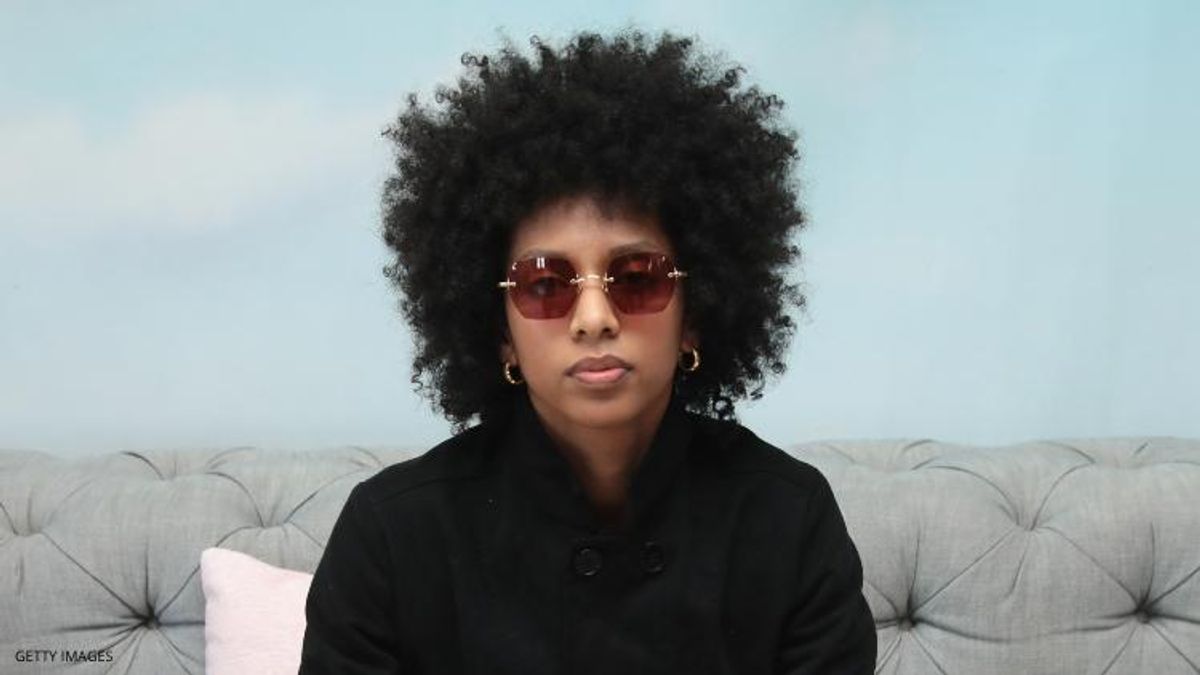
Janaya Khan to Lead First-Ever Out100 Virtual Symposium
The Black Lives Matter leader will moderate a discussion with Joey Soloway,Ashlee Marie Preston, and Kelly Bush Novak about what lies next in the fight for equality and justice in America.
The last four years have been a monumental time for LGBTQ+ people in America, but now is the time to course-correct.
Here to help us navigate exactly how is our Out100 cover star, Janaya Khan, who will be moderating a dynamic "How Do We Come Back From This?" symposium on what moving out of the last four years looks like for culture, politics, the movement, and ourselves.
The symposium, which will drop on Friday and stream exclusively on Out.com, includes Emmy-winning creator of Transparent Joey Soloway, trans activist Ashlee Marie Preston, and PR strategist Kelly Bush Novak.
Together, these advocates for change discuss the larger picture about the future of the Black Lives Matter movement, what the queer community has learned from this moment, and how we can heal ourselves and each other so we can rise up stronger and smarter and bolder than before.
For Soloway, hearing the news of Biden's victory welcomed an onslaught of emotions. Even more so, it encouraged them to think about how the LGBTQ+ community should organize in 2021.
"It's been a crazy week," Soloway says during the symposium, which was filmed a week after Trump lost his presidential race to Biden and Kamala Harris. "I think when it first happened, I had that day of relief. Like, please give me the day that I can say we did it. We had that day on Saturday and I went around and I honked my horn. I honked my horn so hard and yelled so my things out the window and kept going, like, 'Where are people dancing? We gotta dance.' And then the next day, the depression set in. The realization of this 70 million [Trump voters], that we are at the beginning of watching the rise of fascism and the amount of white supremacy in our country, having to realize that. I think a lot of people are at a huge sense of depression and sadness about this place and the size of the work to be done. Yet, I know there is light and I know we will prevail."
"This is a very layered and complex moment," adds Preston. "On one hand, I'm excited about the end of this administration, but I'm not excited about the end of white progressive solidarity now that one of their items has been checked off. We know, historically, what happens. We saw it during marriage equality where husbands and wives took their wedding rings or their new spouses and skipped off into the sunset and left many of us out there to fend for ourselves. While this administration is coming to an end, the work doesn't end. I've had a lot of mixed feelings watching people say, 'Oh my gosh, I'm so happy. It's done. It's over.'"
She adds, "Anybody who grew up watching horror movies the way I did, you know that they're never dead on the first round. You have to fully exorcise them and cast them into hell or else you're going to have a full sequel. It's been challenging for me watching people perform victory in a way that's not checking in with those whose hardships didn't begin or end with this administrator."
"There were 181 attacks on the LGBTQ+ community in this administration, from the trans ban on the military to him saying businesses should just be able to discriminate against the gays if they want to," explains Novak. "We can undo that and we will [in the first 100 days]. But we have to be citizens, and we have to fight every single day -- not just every four years."
"Seventeen percent of the LGBTQ+ community voted for Trump, which was mostly white men who care more about economics than anything else," adds Novak. "But I don't think there's 70 million racists and white supremacists in our country that voted for Donald Trump. In fact, the statistics are that it's about 13 percent of that population that are anti-LGBTQ+ white supremacist, racist people. And the majority of them don't think that they are. That's where our opportunity is -- to bring those people along, to educate them, to let them know the harm that has been done and to be patient. We can't write them off."
There's something, too, that I'm really interested in," says Khan. "There is always at the end of this election time, and with these threads that we're talking about, a sort of discord. For example, there were no celebrations where I am in Inglewood, [California] but there were in Silverlake."
"The Overton window, the lens through which we understand what the norm is and through which policy can be developed, has moved so far to the right that there's there needs to be a kind of rebalancing," they add. "Around the sort of white progressiveness, there is always a [feeling of] 'We need to reach across the aisle.' One of the things that I struggle with is there's always a desire to reach across to bigots before centering the conversation with Black people. Particularly for so many progressives, it's almost as if it's easier to speak to bigots than it is to Black people that enabled these elections to be successful."
This is only a tiny glimpse into the conversation. Watch the first-ever Out100 Symposium, "How Do We Come Back From This," on Friday only at Out.com.








































































